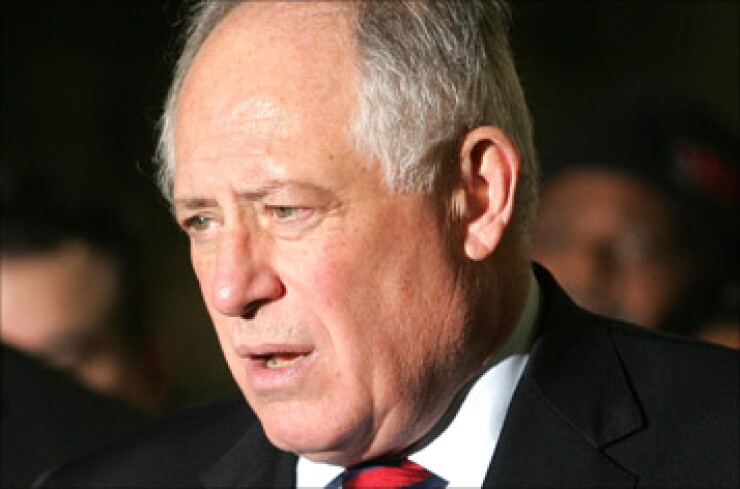
CHICAGO - Illinois' balance sheet remains strained with a $4 billion deficit looming in the coming years as the expiration of a temporary income tax hike saps revenues.
Despite a recently enacted overhaul of its pension system, the state is on track to see its backlog of unpaid bills grow as high as $16 billion from its current $5 billion backlog unless it finds new revenue or cuts spending.
The bleak picture was laid out in three-year fiscal projections
Despite projections for steady economic growth, the state expects a $2 billion drop in income tax revenue in fiscal 2015, which begins July 1.
That's due to the partial expiration midway through the fiscal year of temporary tax hikes that began in 2011. On Jan. 1, 2015 the individual tax rate will drop to 3.75% from 5% and the corporate rate will fall to 5.25% from 7%. Individual income tax collections account for $1.7 billion of the decline expected in the next fiscal year and corporate taxes the other $325 million.
Total income taxes are projected to fall more than $2.5 billion in fiscal 2017 before increasing slightly in fiscal 2018.
The projections put total general fund revenues in fiscal 2015 at $35.2 billion, at $32.8 billion in fiscal 2016 and $33.6 billion in 2018. Those numbers are in comparison to an estimated $36.4 billion this year.
The projections assume sales tax revenues grow at a modest clip rising from $7.6 billion this year to $8.1 billion in fiscal 2017.
With spending growth projected at about 2% for general expenses and healthcare and other expenses also rising at a modest clip, spending grows from $35.9 billion this year to $38.2 billion in fiscal 2017.
The current estimates put the state on pace to close out the current fiscal year with a balance of $458 million. In fiscal 2015, the state could see a nearly $1.9 billion deficit, followed by a $4.1 billion deficit in fiscal 2016, and $4.6 billion of red ink in fiscal 2017.
Without cuts or new revenues, the state's backlog of overdue bills would grow from an estimated $5.6 billion expected when the books are closed on the current fiscal year to $7.5 billion in fiscal 2015, $11.6 billion in fiscal 2017, and $16.2 billion in fiscal 2017. That's after chipping away at the bill backlog this year, bringing it down to $5.6 billion from $6.3 billion at the close of fiscal 2013.
Supporters of extending or making permanent the tax increases or overhauling the tax system will likely use the numbers to promote their position. Republicans are expected to push for spending cuts.
Quinn has not taken a position on an extension of the tax increase. He delivers a state of the state address on Jan. 29 and the fiscal 2015 budget is scheduled to be unveiled in late February.
The three-year report "demonstrates the progress that's been made in tackling the financial challenges that we inherited from the previous administrations," said deputy budget director Abdon Pallasch. "Major pension and Medicaid reforms have been enacted and operations spending has been reduced to historic lows.
"This also reflects the challenge ahead with the expiring revenue," he acknowledged. "It shows the need to develop solution that will allow the state to continue to pay down its bills and protect education and public safety services from radical budget cuts."
The state does not incorporate in fiscal 2015 projections the estimated savings in its annual pension fund contributions expected under the pension overhaul passed by the General Assembly and signed into law by Quinn early last month.
The state does count the savings in fiscal 2016 and 2017 projections. The delay is due to the legal challenges being launched by labor and employee and retiree groups. The Illinois Supreme Court will have the final word on whether the changes violate the state constitution although a federal challenge could also be mounted. If the state law is overturned, the deficit in fiscal 2016 could shoot up by more than $500 million.
The state's bill backlog - which is a reflection of its structural budget imbalance - and looming tax hike expiration are cited by rating agencies as primary credit concerns despite the pension overhaul. All three ratings agencies rate the state's general obligation bonds at the low single A level. Fitch Ratings and Moody's Investors Service assign a negative outlook.
Standard & Poor's recently changed its outlook to "developing" from negative.
"Although we view the consensus achieved by Illinois on this difficult issue as positive from a credit standpoint, the developing outlook reflects the implementation risk -- legal and budgetary -- associated with various provisions of the pension reform, as well as the overall structural budget challenges facing the state," the agency said.





